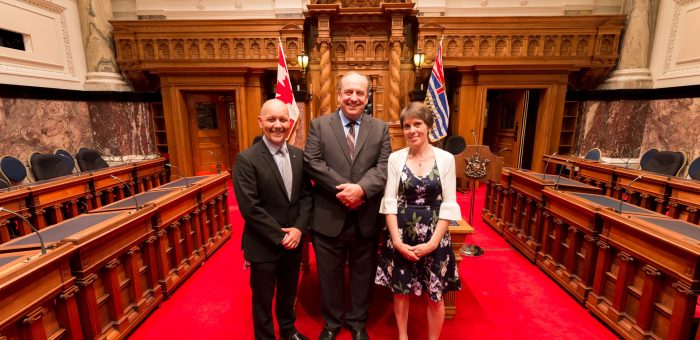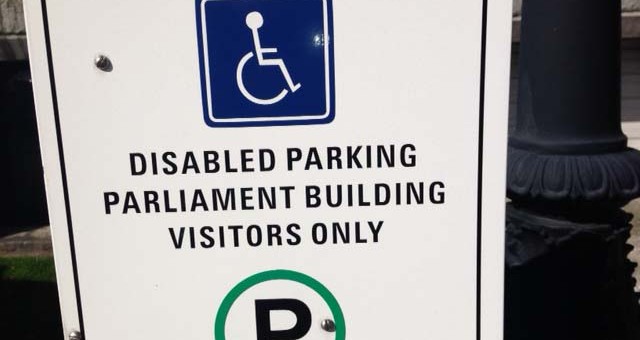Social Development
My initial reaction to the BC Liberal Speech from the Throne
Today in the legislature the Lieutenant Governor read the BC Liberal Speech from the Throne. Below I reproduce the media statement that I released following the speech:
Initial Response
Victoria B.C. – Andrew Weaver, leader of the B.C. Green Party, responded to today’s Speech from the Throne.
The astonishing about-face taken by the B.C. Liberal government in this throne speech demonstrates the difference that the B.C. Greens made in the election and that we continue to make everyday with the minority government.
We committed to addressing the most pressing issues facing British Columbians. For the first time, we now have all-party agreement on major issues like banning big money, investing significantly in child care and raising social assistance rates. All three parties now support holding a referendum on proportional representation that will give British Columbians a legislature that reflects our province’s diversity.
The B.C. Liberals have been in power for sixteen years and until now actively opposed many of these policies. I am heartened to see them adopt so many B.C. Green policies that will address these issues in today’s throne speech. I am also pleased to hear of their willingness to work across party lines. After all, what could be more stable than all three parties working together to advance major policies that will benefit British Columbians.
The confidence vote is a matter of trust. We cannot have confidence in a government that for sixteen years has argued against these policies, and in the last few days has suddenly recognized that they are in the best interests of British Columbians. We will look to the Liberals to demonstrate a genuine willingness to follow through on these commitments regardless of where they sit in the legislature.
Leaders from all three parties have recognized that the results of this election present a once-in-a-lifetime opportunity to work together. I look forward to collaborating with my colleagues on both sides of the house to deliver on the change British Columbians voted for.
-30-
Bill M227 — Court Order Enforcement Amendment Act
Today in the legislature I introduced a private members Bill M227 —Court Order Enforcement Amendment Act, 2017. The bill adds Registered Disability Savings Plans (RDSPs) and Registered Education Savings Plans (RESPs) to the list of plans protected under the act.
Registered Retirement Savings Plans (known as RRSPs) were first introduced federally in 1957. Legislation enabling Registered Retirement Income Funds (known as RRIFs) was subsequently brought forward in the late 1970’s.
RRSPs and RRIFs are protected in BC and most other provinces from creditors in the case of personal bankruptcy. Protecting these funds provides a glimmer of hope that individuals undergoing bankruptcy will not be destitute in their old age.
In 2008 Federal legislation was passed to allow for the creation of Registered Disability Savings Plans (RDSPs). The RDSP is a federal, tax-deferred, long-term savings plan for people with disabilities who want to save for the future. Unfortunately, under our outdated Court Order Enforcement Act, 1996, RDSPs are not listed as a registered plan in BC’s legislation and are therefore not exempt from creditor protection. Should an individual with an RDSP go into debt, their savings in the RDSP will not be protected from seizure. The same is true for Registered Education Savings Plans (known as RESPs). A child should not have their education investment seized due to misfortune that befalls their parents. Alberta has protected RESPs; we should follow suit.
I asked the Minister of Justice about this problem in question period three years ago. At the time, the Minister said that it was an important issue and that she’d be glad to work with me to move it forward. Yet three years have now passed and still nothing has changed. Seeing as I haven’t seen any meaningful progress from the government on this simple legislative change, I decided to offer them a possible solution, yet again.
Text of Bill Introduction
A. Weaver: I move that a bill intituled the Court Order Enforcement Amendment Act, of which notice has been given, be introduced and read a first time now.
Motion approved.
A. Weaver: Registered retirement savings plans are protected in this province from creditors in the case of personal bankruptcy.
Protecting these funds provides a small safeguard that individuals undergoing bankruptcy will not be completely destitute in their old age. It is a good law that most provinces in Canada have adopted.
However, there is no protection for funds that are part of a registered education savings plan or a registered disability savings plan. These are important funds that need equal protection, recognizing that a child should not have their education investment seized due to a misfortune that befalls their parents.
The Alberta government has passed legislation to protect RESPs. It is with this in mind that I bring this bill forward today. This bill amends the Court Order Enforcement Act to ensure that RESPs and RDSPs are protected by law from predators.
I move that the bill be placed on the orders of the day for second reading at the next sitting of the House after today.
Bill M 227, Court Order Enforcement Amendment Act, introduced, read a first time and ordered to be placed on orders of the day for second reading at the next sitting of the House after today.
Video of Bill Introduction
Fixing a Gap in Adult Education
A number of constituents have contacted me regarding the high cost of upgrading high school courses. I wrote to the Minister of Education to ask that he consider removing the barriers to educational access that his government put in place in May 2015. I received a disappointing response which failed to address the key concerns of the letter.
I subsequently wrote to the Minister of Advanced Education urging him to close a gap in coverage that the policy change had created. When government chose to end funding for high school graduates upgrading secondary courses, they forced secondary schools to charge tuition to high school graduates. This included public schools, like SIDES or The Link, which offer online classes and are well suited for academic upgrading.
Along with the policy change government introduced the Adult Upgrading Grant, which is administered by the Ministry of Advanced Education and is meant to provide some support for low-income students. However, this grant only covers courses taken at post-secondary institutions and does not include any of the secondary schools which now have to charge tuition to high school graduates. I asked the minister to extend the grant to a more diverse group of schools, in particular to secondary schools which focus on distributed learning and currently have high rates of enrollment for students upgrading courses.
A non trivial component of the government’s surplus has come at the expense of those who can least afford it. Cuts to those seeking to upgrade their high school education to pursue work and educational opportunities do nothing more than perpetuate the poverty trap. British Colombians deserve a government which will make education more accessible for all British Colombians.
Below I reproduce the text of my letter and I will share the response when it is forthcoming.
Text of the Letter
February 12, 2017
Honourable Andrew Wilkinson
Minister of Advanced Education
PO Box 9080 Stn Prov Govt
Victoria BC
V8W 9E2
Canada
Dear Minister Wilkinson,
I’m writing to you in light of concerns that constituents have brought to my attention regarding the high cost of upgrading high school courses.
As you know, in 2015, the provincial government ended funding for students upgrading high school courses, if they have already graduated. Since that policy change, returning students now face a fee, generally $500-$550 per course, to take grade 11/12 course. These fees place an undue burden on individuals, and their families, as they work to expand their professional and academic opportunities.
I have learned that at the South Island Distance Education School (SIDES) in Victoria alone, there are hundreds of students who are unable to afford the fees of upgrading their courses, and thus remain on the waitlist. This does not include the many who don’t even apply to join the waitlist, discouraged from doing so when they learn the cost.
I have written the Minister of Education about my concerns with this policy and am now writing you to outline a specific gap that it has created.
The Ministry of Education still funds high school courses for students who have not graduated. The Ministry of Advanced Education provides support for low-income students who have graduated and are taking high school level courses at one of nineteen post-secondary institutions.
There is, however, no support for students who have graduated high school and are pursuing academic upgrading through institutions other than post-secondary schools. For example, high school graduates attending public schools in Victoria, like SIDES or the Link, are not eligible for tax deductions, reimbursement under RESPs, or the Adult Upgrading Grant.
These two schools specialize in providing a flexible academic environment to accommodate the needs of students. With many returning students are juggling career and family obligations, this an ideal environment for them to return. Attending a school focused on secondary education can also be less jarring return to the education system for many students.
I find it difficult to understand why two students of similar income levels could take equivalent courses that have comparable prices and that only one would receive government support.
As your ministry oversees the Adult Upgrading Grants, I ask that you increase the number of institutions which are approved to administer them. Specifically, I ask that you give public schools that have a focus on distributed learning the ability to authorize these grants.
If you feel that this falls outside the purview of your ministry, then I urge you to coordinate with the Minister of Education and develop a funding program which would achieve the same results.
I fully believe that we should all fund students who pursue academic upgrading, whether or not they’ve graduated. British Columbians have been promised a high school education, and there is more to that than just a diploma. Whether or not someone has graduated, they should be supported as they flesh out their secondary education, seeking to open their mind or opportunities.
At the very least, this government should, fill the gap that has been created by its policy change and provide the Adult Upgrading Grant to a more diverse group of institutions, including specialized secondary schools.
Sincerely,
Andrew Weaver
MLA, Oak Bay-Gordon Head
It’s time to eliminate the high cost of upgrading high school courses
A number of constituents recently contacted me regarding the high cost of upgrading high school courses. To start the new year, and in anticipation of the upcoming provincial budget to be tabled in February, I wrote to the Minister of Education to ask that he consider removing the barriers to educational access that his government put in place in May 2015.
A non trivial component of the government’s surplus has come at the expense of those who can least afford it. Cuts to those seeking to upgrade their high school education to pursue work and educational opportunities do nothing more than perpetuate the poverty trap.
I reproduce the text of my letter below.
Text of the Letter
January 4, 2017
Honourable Mike Bernier
Ministry of Education
PO Box 9045, Stn Prov Govt
Victoria BC
V8W 9E2
Canada
Dear Minister Bernier,
I’m writing to you today in light of concerns that constituents have brought to my attention regarding the high cost of upgrading high school courses.
Since the subsidy was removed in May 2015, adults now face a fee to upgrade grade 11/12 courses, generally $500-$550 per course. This fee is placing a huge burden on families and individuals looking to upgrade their high school education and pursue work and educational opportunities.
I have learned that at the South Island Distance Education School (SIDES) in Victoria alone, there are hundreds of students who are unable to afford the fees of upgrading their courses, and thus remain on the waitlist; many more don’t even apply to join the waitlist, discouraged from doing so when they learn the cost.
In particular, these fees harm those who are seeking to upgrade their courses at secondary schools, since only courses taken at postsecondary institutions are eligible for tax deductions, reimbursement under RESPs, or the Adult Upgrading Grant.
This situation leaves a significant gap in our support for students, leaving those who upgrade their courses at secondary schools to pay course fees and to go without the financial assistance that benefits students at postsecondary institutions. It is not always an option to attend a post-secondary school: many low-income individuals need the flexibility of distance learning to enable them to balance their studies with their work.
I have heard from families who are struggling financially to help their children cover the costs of these courses. For others, the cost is too high a barrier to overcome, preventing motivated individuals from upgrading the courses they need to attend college or university, and therefore foreclosing the opportunities that would otherwise become available to them.
Currently, the BC Government is penalizing people who return to school, and preventing so many from upgrading their education and realizing the associated opportunities.
Please act to make adult education more accessible. This would be best achieved through reinstating the subsidies to these courses. In the absence of these subsidies, I ask you to extend the eligibility requirements for upgrading grants, to encompass students who upgrade their courses at secondary schools.
Sincerely,
Andrew Weaver
MLA, Oak Bay-Gordon Head
Basic Income Part IV: Recommendations & a Commitment to British Columbians
Introduction
Over the fall, we have explored the concept of basic income in a series of posts on my website, asking for your feedback on each post. The responses I have received, through comments on the website and my Facebook page, as well as in calls and emails to my office, have shown me that there is significant interest in the idea. The reaction has included high levels of support and enthusiasm, as well as a number of concerns and questions.
Your comments and our research have informed our proposal for moving forward with exploring how basic income could contribute to building a better future in BC. In this final post I will summarize what our series has explored so far, and why we should consider basic income as a tool to help us rectify some of the problems that we face today in BC, and those that we may face tomorrow.
The status quo in BC
After a general introduction to the concept of basic income, our second post in the series discussed what poverty looks like in BC, the social assistance programs available and how they can fail to help those most in need. It also explored how basic income could help to alleviate poverty in our province. We know that BC has higher rates of poverty and child poverty than the national average: poverty stands at 11-16% and child poverty is even higher, at 16-20%, depending on the measure used. We also know that poverty is not spread evenly across population groups and regions in BC. Amongst lone parent families, for example, 50% of children live in poverty; aboriginal people, immigrants, and people with disabilities are also more vulnerable. Some regions are disproportionately affected: on the Central Coast, for example, the child poverty rate is above 50%.
After looking at poverty and social assistance in BC, we focussed on the trends we are seeing in the world of work: the rise in precarious employment and the trend towards increasing automation of jobs. Our third post outlined the shift we are experiencing as a population away from long-term, full-time work with benefits, toward short-term, part-time, and contract-based work. Federal Finance Minister Bill Morneau said recently that Canadians must get used to “job churn”, and this is a national trend that BC has not escaped: 75% of jobs created in the last year have been part-time. This situation has left many with significant financial insecurity, juggling part-time jobs, struggling to make ends meet, and worrying about an uncertain future.
We also examined the increasing automation of jobs. Many studies predict that automation will eliminate a huge number of jobs across a range of sectors: one study, for example, predicts 47% of jobs are at high risk of computerization over the next 20 years. Jobs in manufacturing, transportation and warehousing, and office and administrative support are widely cited as the most susceptible (see here and here, for example). The impact on BC of job losses in these sectors would be very significant: the transportation and warehousing sector employs 140,000 people, while manufacturing employs 168,000, down 12,000 from a year ago. Already BC is one of the most unequal provinces in Canada, a problem that automation would exacerbate as it replaces mostly moderate-paying jobs and concentrates the benefits in the hands of a few beneficiaries.
Automation is an issue that those in the technology industry are taking very seriously: Amazon’s chairman, Jeff Bezos, has said “It’s probably hard to overstate how big of an impact it’s going to have on society over the next twenty years.” Yet despite widespread acknowledgement that automation poses a serious threat to our workforce and could have widespread social implications, it does not seem that our government is considering the seriousness of the issue. As politicians we have an obligation to take the threat of automation seriously and prepare for the possibility of a future in which the world of work as we know it is fundamentally altered. We cannot be left playing catch-up, merely reacting to the moves of industry and the development of technology, and rushing to create policies to mitigate the adverse consequences after they have already taken hold.
Recommendations
Already, the economy in BC is not working for many. Despite our wealth as a province, and the many resources on which we can draw, many people in our province face substantial financial insecurity. While we have seen economic growth and the Province projects a budget surplus of $2.24 billion, we have poverty levels that have remained unchanged for years, welfare rates that haven’t increased since 2007 and that leave recipients well below the poverty line, cities that are increasingly unaffordable, and unprecedented rates of food bank use. This is a reality that we have the opportunity, and the obligation, to change.
Moreover, simply raising the minimum wage is not an adequate answer, given the changing conditions in the world of work. A higher minimum wage alone fails to provide financial security to those affected by the rise in precarious employment, as you only benefit to the extent that you maintain stable employment with sufficient hours, something that is becoming unattainable for more and more people. Furthermore, it does not respond to the threat of automation. You need to have a job in order to benefit from a higher minimum wage, so it does not help people made redundant due to automation. Combined with the increasing ability of companies to automate, a higher minimum wage alone also runs the risk of accelerating the drive toward automation, by making humans relatively more expensive than their robotic counterparts.
Basic income could be an effective tool to tackle the persistent, intergenerational poverty we see in BC, and the shortcomings of our current social assistance programs. It could also help those who are suffering from the rise in precarious employment by providing some measure of financial security, and preventing those on the edge from slipping into poverty due to inadequate hours or job transitions. It could also provide a means to make up for the structural unemployment and inequality created by automation, and keep the economy going by providing people with purchasing power. Moreover, basic income has more visionary potential: it could provide people a stable base on which they can take entrepreneurial risks, pursue further education or retraining, or spend more time doing work that is essential to our society but is not financially rewarding, such as taking care of family members in need. It could therefore improve our wellbeing as individuals, and our resilience as a society.
To achieve these goals, a basic income would need to be high enough to raise individuals and families across the Province above the poverty line. To be affordable, it would likely need to be conditional on income (i.e. not a universal basic income to all individuals regardless of income, but rather a targeted payment to those who fall below a determined threshold). It would also need to take into account the differences in the cost of living across BC, to ensure that people are not consigned to poverty in our cities.
Basic income holds exciting prospects for improving the lives of many in our Province and securing us against an uncertain future. However, it is important to recognize some of the uncertainties inherent in the idea and respond to the concerns raised by a number of people who have commented on previous posts.
The most common question is whether basic income would provide a disincentive for people to work. Would basic income encourage people to leave the workforce, or discourage them from joining in the first place? Or, on the other hand, would it provide a safety net, and a level of autonomy necessary to encourage entrepreneurship, retraining, and the pursuit of educational goals? What would be the overall balance in a community? Would there be an effect on young people specifically? The question of how basic income would affect people’s choices about working is difficult to answer in the abstract, and we have limited real-world experience from which to draw. The Dauphin, Manitoba pilot found that the negative effect on people’s willingness to work was negligible for the general population, but more pronounced for mothers with young children, as well as school aged teenagers from low income families, who completed high school instead of leaving to join the workforce. The question of cost has been the second-most discussed issue. What would be the net cost of basic income? Would basic income create an inflationary effect? How would the social benefits translate into cost savings? Which social programs could be streamlined or eliminated, and which supports would need to be maintained, perhaps in an altered form?
Pilot Projects
The need to answer these questions, and others, leads me to conclude that pilot projects are a necessary step in considering implementing basic income in BC. A policy change of this magnitude has significant associated opportunities and risks, many of which cannot be quantified in the absence of real world results. Pilot projects would allow us to test how such a policy could be rolled out effectively, calculate the net costs, and measure the outcomes on families, individuals, and communities in BC.
A number of other jurisdictions are undertaking pilot projects. Finland and the Netherlands are both staging pilots in 2017, while the charity GiveDirectly is staging a pilot in Kenya. In Canada, Ontario is currently undertaking community consultations to inform their roll out of pilot projects in 2017: they are designing their pilots to determine whether basic income would be more effective than their current social programs in lifting people out of poverty and improving health, housing and employment outcomes. Quebec has also shown considerable interest in basic income. And earlier this month, MLAs in PEI voted unanimously to approve a motion calling for developing a basic income pilot project in partnership with the Federal Government. There is no reason why BC should be left behind in the move to test this idea.
To be effective in tracking the effects of basic income on some of the most pressing problems facing BC, including poverty, inequality, and economic change, the places selected for pilots should be particularly affected by these issues. Places such as Port Alberni and Prince Rupert provide examples of potentially appropriate sites for a pilot. One pilot site should be a relatively small town, to enable saturation in order to measure the effects on the community as a whole, as well as on individuals and families within that community. The project would likely need to be at least five years long, in order to enable us to measure the poverty, health, education and employment outcomes, and to calculate the net cost of such a program, taking into account the social benefits that accrue over time. We would seek the partnership of the Federal Government in testing basic income, as PEI has decided to do. We would also need to create residency requirements to avoid a large influx of people into the pilot site.
Beyond these fundamentals, a committee that is independent of the governing party should be established to undertake further analysis of basic income, to hold community and stakeholder consultations, and to advise on the details of how pilot projects should be designed and implemented. There are a number of specific issues that need to be investigated, such as: parameters for tax rates on earned income above the basic income threshold; interactions with other social programs and supports; how to mitigate risks to vulnerable groups; and how to incentivize the pursuit of education as well as paid and unpaid contributions to society.
Conclusion
We must address the unacceptable levels of poverty and inequality in our province, mitigate the adverse consequences of the rise in precarious work, and prepare for a future that may bring fundamental economic change through technological advance. To address these challenges we must create forward-thinking policies, informed by a commitment to a more equitable future and strong evidence on how to get there.
Basic income could be one such policy. It could help us alleviate poverty, foster healthier families and communities, encourage entrepreneurs and volunteers, enable education and retraining, and allow British Columbians dignity and autonomy while they navigate a changing world of work. With the right tools and foresight, and guided by evidence all the way, we can support a 21st century economy that is resilient, and craft a future that works better for everyone.
As premier in a BC Green government, I commit to introducing pilot projects that explore the costs and benefits of basic income.
I continue to welcome your comments, particularly if you haven’t yet had a chance to share your thoughts on basic income and the role it could play in BC.








